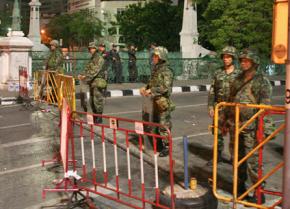Thailand’s military acts to preserve disorder
The head of Thailand's army declared martial law on May 20, giving the military sweeping powers to "maintain public order"--which the generals used immediately to order a halt to all demonstrations, both against the government of ousted Prime Minister Yingluck Shnawatra and in support of it. Gen. Prayuth Chan-ocha claimed his order was not a coup, but this is a country that has experienced 18 successful or attempted military takeovers since it became a constitutional monarchy in 1932.
The declaration of martial comes after months of upheaval encouraged by the military. Last year, Thailand's capital of Bangkok was rocked by unrest as pro-military protesters against the elected Shinawatra government rioted. The demonstrations were encouraged by Suthep Thaugsuban, a high-ranking member of the opposition Democrat Party, which has extensive ties to the army. Using populist rhetoric and complaints of corruption to mask anti-democratic policies, those behind the protests targeted Yingluck and the Puea Thai Party--which is associated with Thailand's pro-democracy "Red Shirt" movement.
The protests continued even after Yingluck dissolved parliament and called elections for early February. The misnamed "Democrat Party," which has not won an election in more than two decades, boycotted the vote and encouraged further protests that turned violent and blocked hundreds of thousands of people from going to the polls. On May 7, the country's Constitutional Court ruled that Shinawatra should be removed from office because of corruption. She has been replaced by one of her former deputies, and a national election has been scheduled for July 20.
is a Thai dissident who lives in exile. Here, he comments on the military's latest grab for power--and where true democracy will need to come from.
TODAY, THAI army Gen. Prayuth Chan-ocha declared martial law without consulting the caretaker government or any other elected representatives. Troops took over all radio and TV stations, and are positioned along major road intersections in Bangkok.
Despite the fact that he claimed that "this is not a coup," Prayuth's actions smell, taste and look like a coup.
This is from a man who has blood on his hands. Four years ago to the day, Prayuth oversaw the shooting down in the streets of almost 90 Red Shirt pro-democracy demonstrators. Before the elections in the following year, he made public statements against the Puea Thai Party. He had previously been a key figure in maneuvering [former Prime Minister] Abhisit Vejjajiva's Anti-Democrat Party into an unelected government in 2008. He has never been brought to court for his crimes and was on the list of those who would be given total amnesty in Yingluck's abortive amnesty bill.
The military say that the declaration of martial law is just to maintain peace and security; if so, it is too little, too late. If the military were really concerned with keeping the peace, they would have acted against Suthep's Anti-Democrat mobs when they invaded government ministries in order to overthrow the elected government at the end of last year. They would have arrested Suthep and his armed thugs who used violence on the streets to wreck the February election.

But the military are just team players on the side of those who want to destroy Thailand's democratic space. They have sat on their hands and watched with glee as the Yingluck government was gradually destroyed and the elections wrecked. Now they estimate that their allies among Suthep's mob and the kangaroo courts have created enough chaos to legitimize military intervention.
Make no mistake, this military "non-coup" will not ensure that free and fair elections take place, and it certainly won't protect freedom of expression. The "non-coup" will instead smooth the way for an unelected "temporary" prime minister. It will smooth the way to fixing the democratic process so that unelected powers can control any future elected government. It is part of the process of decreasing the democratic space.
Democracy can only be built if significant numbers of Red Shirts realize that Puea Thai and the United Front Against Democracy and Dictatorship (UDD) leadership are unwilling and unable to lead a fight. The building of an independent pro-democracy movement based upon the Red Shirts with clear links to the progressive working class and peasantry is long overdue. Such a movement cannot be built overnight but it can and must be built.
First published at Red Thai Socialist.


